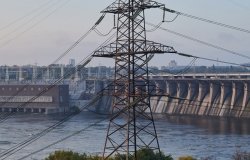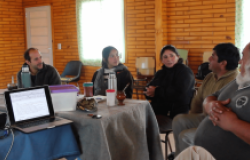Creating a Common European Energy Policy: Efforts Since 1973
with Alberto Tonini, Wilson Center Public Policy Scholar; Assistant Professor of International History, University of Florence
Overview
In opening his discussion of the important issue of energy security in Europe, Alberto Tonini pointed out that the 27 member states of the European Union are now the world's largest importer of energy, mainly in the form of oil and gas. Saudi Arabia which had been a principal supplier has steadily declined in its crude oil provided to Europe since the 1970s, whereas Russia and Norway now are the largest suppliers of oil for the EU. Russia has consistently been and remains the largest supplier of gas, but since the late 1990s Norway, Algeria, and the Netherlands are increasing their supplies and thereby somewhat reducing dependence on Russia.
A common energy policy for Europe is a work in progress, and progress has been reasonably slow since the oil shock of 1973. The European Union has agreed in principle to create a common energy policy, but the member states have not yet transferred the authority or competency for this issue to European Union institutions in Brussels. Momentum for a common energy policy has increased since the early 1980s. The European Commission gathers information, sets targets, and provides enabling activities to the member states. Since 1988 the Commission has moved to liberalize energy procurement, exploration, and distribution and in recent years the emergence of heightened concern about the environment has given the Commission additional leverage over the member states.
A series of agreements have been included among consumers and producers which are designed to stabilize the market, provide steady supplies of oil to Europe and steady income to the suppliers, and overall diminish risk to all participants. First was an agreement in 1989 between the European Union and the Gulf Cooperation Council, which includes the main oil and gas suppliers from the Persian Gulf. This was followed in 1991 by the TACIS technical assistance agreement between the EU and twelve of the newly-independent states in the Caucasus and Central Asia. This agreement has components which provide assistance for a transportation corridor and coordinates pipeline policies. Russia is not a member of TACIS. The European Energy Charter of 1994 includes 52 member states and sets up rules of trade and tries to diminish risk. The Euro-Mediterranean partnership of 1995 is not specifically about energy but does provide financial and technical assistance from the European Union to ten Mediterranean states. Finally, the Baku Initiative of 2004 seeks to enhance energy cooperation between the EU and the Black Sea and Caspian Basin regions.
Taken together the efforts of the Commission and the set of agreements lay the basis for progress, and the current President of the EU Commission has made a common policy for energy security one of the Commission's top priorities for the next several years.
Hosted By

Global Europe Program
The Global Europe Program is focused on Europe’s capabilities, and how it engages on critical global issues. We investigate European approaches to critical global issues. We examine Europe’s relations with Russia and Eurasia, China and the Indo-Pacific, the Middle East and Africa. Our initiatives include “Ukraine in Europe” – an examination of what it will take to make Ukraine’s European future a reality. But we also examine the role of NATO, the European Union and the OSCE, Europe’s energy security, transatlantic trade disputes, and challenges to democracy. The Global Europe Program’s staff, scholars-in-residence, and Global Fellows participate in seminars, policy study groups, and international conferences to provide analytical recommendations to policy makers and the media. Read more
Thank you for your interest in this event. Please send any feedback or questions to our Events staff.










